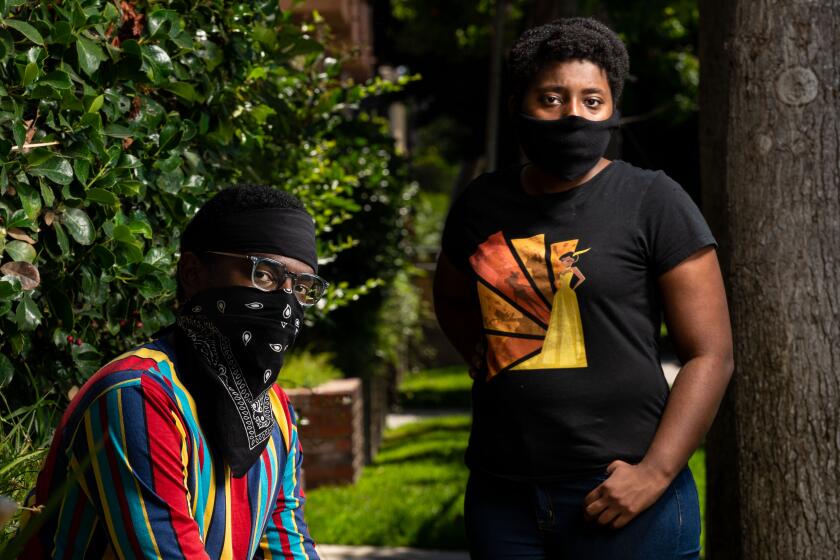TV networks pledged to improve diversity in 1999. Will this time be any different?
- Share via
Kweisi Mfume was not having it when he declared war on broadcast TV.
Mfume was president of the NAACP in July 1999 when he became upset after scanning the fall schedules of the four major broadcast networks and saw that none of the 26 new comedies and dramas being launched had a minority performer in a leading or prominent role.
“When the television viewing public sits down to watch the new prime-time shows scheduled for this fall’s lineup, they will see a virtual whitewash in programming,” Mfume said at the time, before the explosion of cable networks and streaming platforms that have often proved more inclusive of BIPOC (Black, Indigenous and people of color) talent. “This glaring omission is an outrage and a shameful display by network executives who are either clueless, careless or both.”
Speaking just before the civil rights organization’s 90th annual convention in New York, Mfume threatened CBS, NBC, ABC and Fox with a variety of actions, including possible litigation, as well as viewer boycotts of the networks and of advertisers who “feel it is OK to advertise on these highly segregated shows.”
The initial response to Mfume’s accusations was denial: Officials for all four networks insisted they were concerned and sensitive to the issue of diversity. ABC and NBC acknowledged they “need to do more.”
Within months, memorandums of understanding promising improvement were signed by the networks, which appointed diversity executives to oversee the process. The NAACP joined forces with several minority advocacy groups, including the National Hispanic Media Coalition, which issued regular report cards grading the movement.
Mfume’s campaign sparked a decades-long, roller-coaster battle within the TV industry over diversity in front of and behind the camera. The 20-plus years since his “virtual whitewash” declaration have shown forward but erratic progress on the issue among the broadcast networks, marked by glowing successes and troubling shortfalls.
Shonda Rhimes (“Scandal”), Kenya Barris (“black-ish”) and Lee Daniels (“Empire”) are a few of the Black producers who have proven to be powerful forces in the TV arena, while Kerry Washington, Viola Davis, Shemar Moore, Terrence Howard, Anthony Anderson and Tracee Ellis Ross are among the numerous Black performers who have headed hit series.
Amid nationwide marches for Black lives, Black animation professionals speak about systemic racism in the industry and the need for diversity.
But those triumphs have been matched by significant setbacks, usually followed by corporate statements saying “we need to do better.” Each network has come under fire for a variety of concerns, including predominantly white prime-time schedules, stereotypical images, and charges of exclusion, discrimination and racism.
The continual and elusive struggle to grasp the complexity of diversity in TV took an abrupt turn in recent months as ABC, NBC, CBS and Fox hurried to show solidarity with the Black Lives Matter movement by making announcements touting an unprecedented commitment to diversity, particularly to Black performers and producers. The announcements show a marked escalation in pledges from past years, when executives said they were trying to increase diversity but in many cases offered little follow-through.
Several observers of and participants in the efforts to increase the presence of Black people and other people of color dating to 1999 are eyeing the announcements with caution, ranging from optimism to skepticism that the latest round of pledges will lead to significant change.
“I think some of what these companies are saying is public relations, being done out of fear of being outed or ostracized,” said Mitsy Wilson, formerly the senior vice president of diversity development for the Fox Entertainment Group and News Corp. “But now they will be held accountable. I’m hopeful that all that has been promised will happen.”
Darnell Hunt, dean of social sciences at UCLA and a professor of sociology and African American studies who has headed several studies examining entertainment industry diversity, said 1999 was a real “turning point in the discourse” about diversity in Hollywood.
“It wound up on the front page, and there was lots of movement, including the appointments of vice presidents in charge of diversity,” Hunt said. “But whether the networks lived up to what they said they were going to do is another story.”
Maintaining that the industry has been caught in a cycle of progress and retreat on diversity, Hunt said, “We can’t go back to that cycle.” He said the TV industry needs more Black executives in positions with the power to greenlight projects. “The bottom line is, who’s calling the shots? The industry needs to be more in sync with what’s happening in the rest of the country.”
Anne-Marie Johnson, an actress and activist, was less optimistic about whether Hollywood would follow through on the new pledges, saying it will eventually lose momentum.
“It’s not going to have any urgency,” said Johnson, who has appeared in numerous films and television series, including costarring in the television version of “In the Heat of the Night.” “I fear this is going to fade away, just like a fad. Why does this always have to be such a struggle? It’s very depressing and insulting.”
In a striking contrast to 1999, all four broadcast networks will air new series featuring Black performers in leading or prominent roles to add to their existing slates, which already feature people of color as series leads.
Among the new series are ABC’s “Big Sky” with Kylie Bunbury and a reboot of the game show “Supermarket Sweep” hosted by former “Saturday Night Live” cast member Leslie Jones. Fox will pick up “L.A.’s Finest,” a police drama currently on Spectrum that stars Gabrielle Union and Jessica Alba. CBS will launch a reboot of the drama series “The Equalizer” starring Queen Latifah.
In the wake of the cancellation of “Cops” and “Live PD,’ the makers of the podcast “Running From Cops” explain how ride-along shows manipulate the reality of policing.
Among the other diversity-related announcements:
- CBS Television Studios and the NAACP have entered into a multiyear agreement to develop and produce scripted and unscripted programming in addition to documentary content. CBS has also committed to increasing the proportion of people of color on its series’ writing staffs and the proportion of script-development money devoted to series with creators or producers of color.
- NBC will add an experienced writer of color to the writing staff of its existing series.
- Taraji P. Henson, who starred in Fox’s “Empire,” is developing a spinoff series centered on her “Empire” character, Loretha “Cookie” Lyon at Fox Entertainment as part of a two-year first-look deal she has signed with the show’s producer, 20th Century Fox Television.
- For the first time in its 18-year, 40-season history, the ABC hit reality-show “The Bachelor” franchise will have a black male lead — real estate broker Matt James — and Tyra Banks is replacing Tom Bergeron as host of “Dancing with the Stars.” ABC is also reviving the nostalgic coming-of-age comedy “The Wonder Years,” which will now center on a Black middle-class family in the 1960s. The series is being developed by Daniels and Fred Savage, who starred in the original version.
Some of the news has already been met with skepticism and cynicism.
The announcement of James as the new “Bachelor” came just a few days after fans of the show launched an antiracism campaign calling on ABC and Warner Bros., which produces the series, to diversify the franchise.
Rachel Lindsay, who became the franchise’s first and only Black woman lead in 2017, said in an appearance on “Good Morning America” that she hoped James’ casting was not the network’s way of “putting a Band-Aid over the situation and just saying, ‘Here, we’re going to put this here. Are you happy now?”’ Before “The Bachelor” announcement, she had threatened to dissociate herself from the “Bachelor” brand unless it got a “diversity makeover.”
Responding to the news of “The Wonder Years” spinoff, Johnson scoffed. “We don’t need a Black version of that show. We already had it — it was called ‘Everybody Hates Chris.’ It’s ‘The Wonder Years’ in blackface.”
Wilson, who is an executive coach and a diversity and inclusion consultant, said she will be watching closely in the coming months to determine whether there is any real change.
She hopes progress moves more smoothly and quickly than in the past: “Things cannot go back to normal.”
More to Read
The complete guide to home viewing
Get Screen Gab for everything about the TV shows and streaming movies everyone’s talking about.
You may occasionally receive promotional content from the Los Angeles Times.








